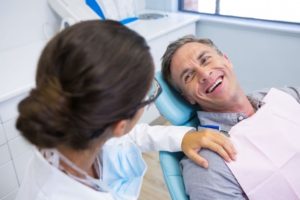No comments yet.
RSS feed for comments on this post.
Sorry, the comment form is closed at this time.

Oral cancer is a menace; roughly 50,000 cases are diagnosed in the US each year, and sadly, many more cases go completely undiagnosed! But believe it or not, oral cancer is actually among the most preventable types of cancer; especially if you know what to look for and what measures to take. Here’s more from your dentist about some of the most common oral cancer risk factors and symptoms you should know about, along with why prevention and early detection is so crucial.
Oral cancer is a type of cancer that develops in the tissues of the mouth or throat; it belongs to a larger group of cancers called head and neck cancers, and most develop in the squamous cells found in the mouth, tongue, and lips. It is often categorized into five stages, based on its size and severity using the roman numbers 0 – IV.
Despite its prominence, researchers aren’t quite sure what specifically causes oral cancer; however, they have successfully linked it with several different things including:
It goes without saying that you should be keeping a close eye on your oral health at all times, especially if you’re concerned about mitigating oral cancer. Some of these symptoms, including a sore throat or earache, might indicate other conditions—but if you notice any of these symptoms, especially if they’re persistent or combined with other indicators, don’t hesitate to contact your dentist.
Oral cancer is quite preventable, but it depends on your willingness to stay diligent and make wise lifestyle choices. Quitting smoking, sticking to a healthy diet, and protecting your mouth from certain things all play an integral role in preventing oral cancer—but one of the best things you can do is visit your dentist for preventive care, ideally every six months.
During these visits, your dentist can perform a health screening and investigate your mouth for signs of oral cancer. They’ll use any combination of X-rays, scans, biopsies, and more to thoroughly search for any signs of the disease. Since the five stages of oral cancer increase in severity, catching the disease in its early stages greatly increases the patient’s chances of survival!
If you’re concerned about oral cancer and think you might be at risk, don’t hesitate to visit your dentist for a screening. Treatment is readily available and seeking it sooner rather than later is in your best interest!
Dr. George Keanna received his DDS from the Georgetown University School of Dentistry and has proudly served patients and families in the Albuquerque, NM area for several years. His practice is pleased to offer a wide range of preventive services including oral cancer screenings. If you have any questions about the article or would like to arrange a visit for you or a loved one, you can contact the practice online or by phone for further assistance: (505) 292-8533.